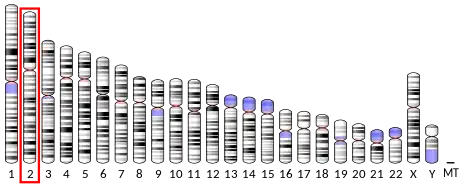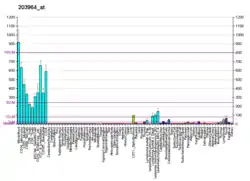N-myc-interactor also known as N-myc and STAT interactor is a protein that in humans is encoded by the NMI gene.[5][6][7]
Function
NMYC interactor (NMI) interacts with NMYC and CMYC (two members of the oncogene Myc family), and other transcription factors containing a Zip, HLH, or HLH-Zip motif. The NMI protein also interacts with all STATs except STAT2 and augments STAT-mediated transcription in response to cytokines IL-2 and IFN-gamma. The NMI mRNA has low expression levels in all human fetal and adult tissues tested except brain and has high expression in cancer cell line-myeloid leukemias.[7]
Interactions
NMI (gene) has been shown to interact with BRCA1,[8] IFI35,[9] Myc,[8] and STAT5A,[6] and TUBA3C.[10]
References
- 1 2 3 GRCh38: Ensembl release 89: ENSG00000123609 - Ensembl, May 2017
- 1 2 3 GRCm38: Ensembl release 89: ENSMUSG00000026946 - Ensembl, May 2017
- ↑ "Human PubMed Reference:". National Center for Biotechnology Information, U.S. National Library of Medicine.
- ↑ "Mouse PubMed Reference:". National Center for Biotechnology Information, U.S. National Library of Medicine.
- ↑ Bao J, Zervos AS (Aug 1996). "Isolation and characterization of Nmi, a novel partner of Myc proteins". Oncogene. 12 (10): 2171–6. PMID 8668343.
- 1 2 Zhu M, John S, Berg M, Leonard WJ (Mar 1999). "Functional association of Nmi with Stat5 and Stat1 in IL-2- and IFNgamma-mediated signaling". Cell. 96 (1): 121–30. doi:10.1016/S0092-8674(00)80965-4. PMID 9989503. S2CID 14758136.
- 1 2 "Entrez Gene: NMI N-myc (and STAT) interactor".
- 1 2 Li H, Lee TH, Avraham H (June 2002). "A novel tricomplex of BRCA1, Nmi, and c-Myc inhibits c-Myc-induced human telomerase reverse transcriptase gene (hTERT) promoter activity in breast cancer". J. Biol. Chem. 277 (23): 20965–73. doi:10.1074/jbc.M112231200. PMID 11916966.
- ↑ Chen J, Shpall RL, Meyerdierks A, Hagemeier M, Böttger EC, Naumovski L (November 2000). "Interferon-inducible Myc/STAT-interacting protein Nmi associates with IFP 35 into a high molecular mass complex and inhibits proteasome-mediated degradation of IFP 35". J. Biol. Chem. 275 (46): 36278–84. doi:10.1074/jbc.M006975200. PMID 10950963.
- ↑ Rual JF, Venkatesan K, Hao T, Hirozane-Kishikawa T, Dricot A, Li N, Berriz GF, Gibbons FD, Dreze M, Ayivi-Guedehoussou N, Klitgord N, Simon C, Boxem M, Milstein S, Rosenberg J, Goldberg DS, Zhang LV, Wong SL, Franklin G, Li S, Albala JS, Lim J, Fraughton C, Llamosas E, Cevik S, Bex C, Lamesch P, Sikorski RS, Vandenhaute J, Zoghbi HY, Smolyar A, Bosak S, Sequerra R, Doucette-Stamm L, Cusick ME, Hill DE, Roth FP, Vidal M (October 2005). "Towards a proteome-scale map of the human protein-protein interaction network". Nature. 437 (7062): 1173–8. Bibcode:2005Natur.437.1173R. doi:10.1038/nature04209. PMID 16189514. S2CID 4427026.
Further reading
- Lebrun SJ, Shpall RL, Naumovski L (1998). "Interferon-induced upregulation and cytoplasmic localization of Myc-interacting protein Nmi". J. Interferon Cytokine Res. 18 (9): 767–71. doi:10.1089/jir.1998.18.767. PMID 9781816.
- Lee ND, Chen J, Shpall RL, Naumovski L (1999). "Subcellular localization of interferon-inducible Myc/stat-interacting protein Nmi is regulated by a novel IFP 35 homologous domain". J. Interferon Cytokine Res. 19 (11): 1245–52. doi:10.1089/107999099312902. PMID 10574616.
- Bannasch D, Weis I, Schwab M (2000). "Nmi protein interacts with regions that differ between MycN and Myc and is localized in the cytoplasm of neuroblastoma cells in contrast to nuclear MycN". Oncogene. 18 (48): 6810–7. doi:10.1038/sj.onc.1203090. PMID 10597290.
- Zhou X, Liao J, Meyerdierks A, et al. (2000). "Interferon-alpha induces nmi-IFP35 heterodimeric complex formation that is affected by the phosphorylation of IFP35". J. Biol. Chem. 275 (28): 21364–71. doi:10.1074/jbc.M003177200. PMID 10779520.
- Chen J, Shpall RL, Meyerdierks A, et al. (2000). "Interferon-inducible Myc/STAT-interacting protein Nmi associates with IFP 35 into a high molecular mass complex and inhibits proteasome-mediated degradation of IFP 35". J. Biol. Chem. 275 (46): 36278–84. doi:10.1074/jbc.M006975200. PMID 10950963.
- Chen J, Naumovski L (2002). "Intracellular redistribution of interferon-inducible proteins Nmi and IFP 35 in apoptotic cells". J. Interferon Cytokine Res. 22 (2): 237–43. doi:10.1089/107999002753536211. PMID 11911807.
- Li H, Lee TH, Avraham H (2002). "A novel tricomplex of BRCA1, Nmi, and c-Myc inhibits c-Myc-induced human telomerase reverse transcriptase gene (hTERT) promoter activity in breast cancer". J. Biol. Chem. 277 (23): 20965–73. doi:10.1074/jbc.M112231200. PMID 11916966.
- Sun GJ, Tong X, Dong Y, et al. (2002). "[Identification of a protein interacting with apoptin from human leucocyte cDNA library by using yeast two-hybrid screening]". Sheng Wu Hua Xue Yu Sheng Wu Wu Li Xue Bao. 34 (3): 369–72. PMID 12019454.
- Strausberg RL, Feingold EA, Grouse LH, et al. (2003). "Generation and initial analysis of more than 15,000 full-length human and mouse cDNA sequences". Proc. Natl. Acad. Sci. U.S.A. 99 (26): 16899–903. Bibcode:2002PNAS...9916899M. doi:10.1073/pnas.242603899. PMC 139241. PMID 12477932.
- Ota T, Suzuki Y, Nishikawa T, et al. (2004). "Complete sequencing and characterization of 21,243 full-length human cDNAs". Nat. Genet. 36 (1): 40–5. doi:10.1038/ng1285. PMID 14702039.
- Lehner B, Sanderson CM (2004). "A protein interaction framework for human mRNA degradation". Genome Res. 14 (7): 1315–23. doi:10.1101/gr.2122004. PMC 442147. PMID 15231747.
- Gerhard DS, Wagner L, Feingold EA, et al. (2004). "The status, quality, and expansion of the NIH full-length cDNA project: the Mammalian Gene Collection (MGC)". Genome Res. 14 (10B): 2121–7. doi:10.1101/gr.2596504. PMC 528928. PMID 15489334.
- Hillier LW, Graves TA, Fulton RS, et al. (2005). "Generation and annotation of the DNA sequences of human chromosomes 2 and 4". Nature. 434 (7034): 724–31. Bibcode:2005Natur.434..724H. doi:10.1038/nature03466. PMID 15815621.
- Jung HH, Lee J, Kim JH, et al. (2005). "STAT1 and Nmi are downstream targets of Ets-1 transcription factor in MCF-7 human breast cancer cell". FEBS Lett. 579 (18): 3941–6. doi:10.1016/j.febslet.2005.06.011. PMID 15996661. S2CID 23206849.
- Rual JF, Venkatesan K, Hao T, et al. (2005). "Towards a proteome-scale map of the human protein-protein interaction network". Nature. 437 (7062): 1173–8. Bibcode:2005Natur.437.1173R. doi:10.1038/nature04209. PMID 16189514. S2CID 4427026.
- Schlierf B, Lang S, Kosian T, et al. (2005). "The high-mobility group transcription factor Sox10 interacts with the N-myc-interacting protein Nmi". J. Mol. Biol. 353 (5): 1033–42. doi:10.1016/j.jmb.2005.09.013. PMID 16214168.
- Zhang L, Tang Y, Tie Y, et al. (2007). "The PH domain containing protein CKIP-1 binds to IFP35 and Nmi and is involved in cytokine signaling". Cell. Signal. 19 (5): 932–44. doi:10.1016/j.cellsig.2006.11.002. PMID 17197158.
- Albihn A, Mo H, Yang Y, Henriksson M (2007). "Camptothecin-induced apoptosis is enhanced by Myc and involves PKCdelta signaling". Int. J. Cancer. 121 (8): 1821–9. doi:10.1002/ijc.22866. PMID 17565738. S2CID 22194144.
This article is issued from Wikipedia. The text is licensed under Creative Commons - Attribution - Sharealike. Additional terms may apply for the media files.




